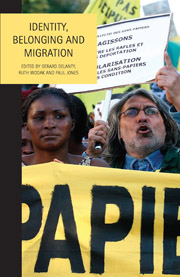Book contents
- Frontmatter
- Contents
- Acknowledgements
- List of Figures
- Notes on Contributors
- Introduction: Migration, Discrimination and Belonging in Europe
- I Theoretical Perspectives on Belonging
- 1 Belonging and European Identity
- 2 Identity, Belonging and Migration: Beyond Constructing ‘Others’
- 3 ‘Us’ and ‘Them’: Inclusion and Exclusion – Discrimination via Discourse
- 4 Dilemmas of Secularism: Europe, Religion and the Problem of Pluralism
- II Institutional Forms of Discrimination
- III Cases of Belonging and Exclusion
- Conclusion: Discrimination as a Modern European Legacy
- Index
2 - Identity, Belonging and Migration: Beyond Constructing ‘Others’
from I - Theoretical Perspectives on Belonging
- Frontmatter
- Contents
- Acknowledgements
- List of Figures
- Notes on Contributors
- Introduction: Migration, Discrimination and Belonging in Europe
- I Theoretical Perspectives on Belonging
- 1 Belonging and European Identity
- 2 Identity, Belonging and Migration: Beyond Constructing ‘Others’
- 3 ‘Us’ and ‘Them’: Inclusion and Exclusion – Discrimination via Discourse
- 4 Dilemmas of Secularism: Europe, Religion and the Problem of Pluralism
- II Institutional Forms of Discrimination
- III Cases of Belonging and Exclusion
- Conclusion: Discrimination as a Modern European Legacy
- Index
Summary
Due to the lack of theoretical rigour and precision that so often accompanies its use, the concept of ‘identity’ is not necessarily the best way in which to conceptualize an individual's relation to a collective. In fact, the casual application of this highly elastic yet undifferentiated concept to empirical research on migration has meant that the potential of ‘identity’ to operate as an overarching explanatory framework is highly problematic, often serving to hide more than it reveals. We would like to suggest that the notion of ‘belonging’ is central not only to the sustained critique of the concept of identity, but also for developing a coherent and context-sensitive theoretical model that supports empirical social scientific research in this area. However, and even given these concerns, we are not calling for the abandonment of the concept of identity, but rather for a ‘conceptual unpacking’, which would allow the multiple, highly complex processes associated with identity construction to be revealed rather than – as is often the case – concealed.
Of course, ‘belonging’ is not a novel response to the analytical shortcomings of the concept of identity; it has a long history in both political and social theory. But the re-emergence of the term in the social scientific literature (for example, Probyn 1996; Fortier 2000; Sicakkan and Lithman 2005) can be explained by the fact that the concept provides social scientists the potential to capture something of the complexity and multiplicity in a way that arguably ‘identity’ does not.
- Type
- Chapter
- Information
- Identity, Belonging and Migration , pp. 38 - 53Publisher: Liverpool University PressPrint publication year: 2011
- 9
- Cited by



